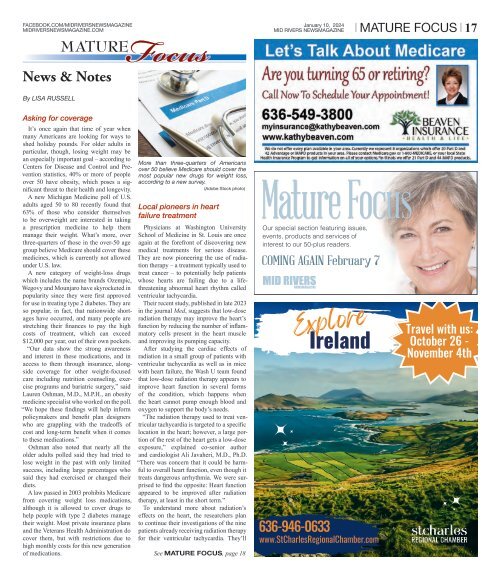Mid Rivers Newsmagazine 1-10-24
Local news, local politics and community events for St. Charles County Missouri.
Local news, local politics and community events for St. Charles County Missouri.
You also want an ePaper? Increase the reach of your titles
YUMPU automatically turns print PDFs into web optimized ePapers that Google loves.
FACEBOOK.COM/MIDRIVERSNEWSMAGAZINE<br />
MIDRIVERSNEWSMAGAZINE.COM<br />
January <strong>10</strong>, 20<strong>24</strong><br />
MID RIVERS NEWSMAGAZINE<br />
I MATURE FOCUS I 17<br />
News & Notes<br />
By LISA RUSSELL<br />
Asking for coverage<br />
It’s once again that time of year when<br />
many Americans are looking for ways to<br />
shed holiday pounds. For older adults in<br />
particular, though, losing weight may be<br />
an especially important goal – according to<br />
Centers for Disease and Control and Prevention<br />
statistics, 40% or more of people<br />
over 50 have obesity, which poses a significant<br />
threat to their health and longevity.<br />
A new Michigan Medicine poll of U.S.<br />
adults aged 50 to 80 recently found that<br />
63% of those who consider themselves<br />
to be overweight are interested in taking<br />
a prescription medicine to help them<br />
manage their weight. What’s more, over<br />
three-quarters of those in the over-50 age<br />
group believe Medicare should cover these<br />
medicines, which is currently not allowed<br />
under U.S. law.<br />
A new category of weight-loss drugs<br />
which includes the name brands Ozempic,<br />
Wegovy and Mounjaro have skyrocketed in<br />
popularity since they were first approved<br />
for use in treating type 2 diabetes. They are<br />
so popular, in fact, that nationwide shortages<br />
have occurred, and many people are<br />
stretching their finances to pay the high<br />
costs of treatment, which can exceed<br />
$12,000 per year, out of their own pockets.<br />
“Our data show the strong awareness<br />
and interest in these medications, and in<br />
access to them through insurance, alongside<br />
coverage for other weight-focused<br />
care including nutrition counseling, exercise<br />
programs and bariatric surgery,” said<br />
Lauren Oshman, M.D., M.P.H., an obesity<br />
medicine specialist who worked on the poll.<br />
“We hope these findings will help inform<br />
policymakers and benefit plan designers<br />
who are grappling with the tradeoffs of<br />
cost and long-term benefit when it comes<br />
to these medications.”<br />
Oshman also noted that nearly all the<br />
older adults polled said they had tried to<br />
lose weight in the past with only limited<br />
success, including large percentages who<br />
said they had exercised or changed their<br />
diets.<br />
A law passed in 2003 prohibits Medicare<br />
from covering weight loss medications,<br />
although it is allowed to cover drugs to<br />
help people with type 2 diabetes manage<br />
their weight. Most private insurance plans<br />
and the Veterans Health Administration do<br />
cover them, but with restrictions due to<br />
high monthly costs for this new generation<br />
of medications.<br />
More than three-quarters of Americans<br />
over 50 believe Medicare should cover the<br />
most popular new drugs for weight loss,<br />
according to a new survey.<br />
(Adobe Stock photo)<br />
Local pioneers in heart<br />
failure treatment<br />
Physicians at Washington University<br />
School of Medicine in St. Louis are once<br />
again at the forefront of discovering new<br />
medical treatments for serious disease.<br />
They are now pioneering the use of radiation<br />
therapy – a treatment typically used to<br />
treat cancer – to potentially help patients<br />
whose hearts are failing due to a lifethreatening<br />
abnormal heart rhythm called<br />
ventricular tachycardia.<br />
Their recent study, published in late 2023<br />
in the journal Med, suggests that low-dose<br />
radiation therapy may improve the heart’s<br />
function by reducing the number of inflammatory<br />
cells present in the heart muscle<br />
and improving its pumping capacity.<br />
After studying the cardiac effects of<br />
radiation in a small group of patients with<br />
ventricular tachycardia as well as in mice<br />
with heart failure, the Wash U team found<br />
that low-dose radiation therapy appears to<br />
improve heart function in several forms<br />
of the condition, which happens when<br />
the heart cannot pump enough blood and<br />
oxygen to support the body’s needs.<br />
“The radiation therapy used to treat ventricular<br />
tachycardia is targeted to a specific<br />
location in the heart; however, a large portion<br />
of the rest of the heart gets a low-dose<br />
exposure,” explained co-senior author<br />
and cardiologist Ali Javaheri, M.D., Ph.D.<br />
“There was concern that it could be harmful<br />
to overall heart function, even though it<br />
treats dangerous arrhythmia. We were surprised<br />
to find the opposite: Heart function<br />
appeared to be improved after radiation<br />
therapy, at least in the short term.”<br />
To understand more about radiation’s<br />
effects on the heart, the researchers plan<br />
to continue their investigations of the nine<br />
patients already receiving radiation therapy<br />
for their ventricular tachycardia. They’ll<br />
See MATURE FOCUS, page 18<br />
Mature Focus<br />
Our special section featuring issues,<br />
events, products and services of<br />
interest to our 50-plus readers.<br />
COMING AGAIN February 7<br />
Explore<br />
Ireland<br />
636-946-0633<br />
www.StCharlesRegionalChamber.com<br />
Travel with us:<br />
October 26 -<br />
November 4th

















